Keywords
research ethics, ethics review, grant assessment, Horizon 2020
This article is included in the Research on Research, Policy & Culture gateway.
research ethics, ethics review, grant assessment, Horizon 2020
This version includes correction of typing errors in the text and figures, and examples of training needs for grant applicants.
See the authors' detailed response to the review by Juraj Koppel
See the authors' detailed response to the review by Vasiliki Mollaki
Ethics is a universal aspect of the research process, from planning and conduct of research, social and cultural relations in research, to reporting of research findings and use of research results. In recent years, ethics has received significant attention from not only researchers, but also policy makers, funders, and lay population due to the rising awareness of the importance of ethics issues in research and consequences of unethical behaviour in research (ALLEA, 2017; Mejlgaard et al., 2020). The existence of ethics standards in research leads to the greater cultural, social, and national equality in research by providing standardized approach to issues in different contexts (Nordling, 2018), and compliance with ethics standards is expected from all who perform research. It is also an important part of education and training in research (Resnik, 2020).
Researchers should be aware of ethics issues that arise from their research plan and take necessary steps to address these issues. However, evidence shows that researchers generally do not perform well in identifying ethics issues in their own research (Taljaard et al., 2011). We have even less evidence about how researchers identify and address ethics issues in grant proposals, mostly due to the lack of available data on this aspect of research grant evaluation, despite abundance of information and instructions by funding agencies (European Commission, 2013). The evaluation of researcher’s ability to identify and address ethics issues in research proposals follows the same principles as scientific evaluation of grant proposals, so that the current gold standard in granting agencies is evaluation by ethics experts in a process of ethics review, which comes usually just after scientific evaluation of grant proposals (European Commission, 2019a). It is expected that, if grant applicants are fully capable to detect ethics issues in research proposals, their assessments should not differ from that of ethics experts.
The aim of this study was to describe the ethics review process in two of the flagship funding programmes of Horizon 2020 (H2020) – the EU’s research and innovation framework programme from 2014 to 2020: the Marie Skłodowska-Curie Actions (MSCA) and the European Research Council (ERC). More specifically, we analysed the Individual Fellowships (IF) and Innovative Training Networks (ITN) from MSCA, and ERC grants (namely the Starting, Consolidator and Advanced grants). We compared ethics issues identified by the applicants in grant proposals with those identified by ethics experts during the ethics review, as well as ethics requirements resulting from this process.
The MSCA and ERC programmes are two flagships of H2020. Their initial earmarked budget amounted to 6.2 and 13.1 billion Euro, respectively, representing around 25% of the initial H2020 overall budget (European Commission, 2013).
The MSCA programme is composed of a set of funding schemes (actions), mostly dedicated to research training and career development of mobile researchers, especially those at an earlier career stage (Pina et al., 2015). Among these actions, the IF covers transnational postdoctoral research training, and ITN specifically targets doctoral training of early-stage researchers. These two actions represent around 95% of the total number of MSCA proposals submitted and funded.
The ERC grants are funding principal investigators and their teams on frontier research. The programme has remained quite stable since its inception in 2007. Taken together, the MSCA IF, ITN, and the ERC grants represent more than 42% of the overall eligible proposals submitted to the whole H2020 programme, and with success rates in the range of around 8–15%, they are among the most competitive funding scheme of the framework programme.
Both MSCA and ERC programmes cover all fields of research, in a so-called bottom-up approach. This means that applicants are free to apply for any type of research, with no ex-ante priority given to specific topics. This contrasts with most of the rest of the H2020 programmes. However, for evaluation purposes, MSCA applicants are asked to submit proposals in one of eight scientific panels: Chemistry (CHE), Social Sciences and Humanities (SOC), Economic Sciences (ECO), Information Science and Engineering (ENG), Environment and Geosciences (ENV), Life Sciences (LIF), Mathematics (MAT), and Physics (PHY). In the ERC, proposals are submitted to scientific panels belonging to one of the three following research domains: Life Sciences (LS), Physical Sciences and Engineering (PH), and Social Sciences and Humanities (SH). To facilitate the comparison of the two programmes, we grouped the ECO and SOC panels of MSCA as a proxy for the SH domain of ERC, and the CHE, ENG, ENV, MAT, PHY panels of MSCA as a proxy for the PH domain of ERC. Only the LIF panel in MSCA was considered as an equivalent of the LS domain of ERC.
The ethics review procedure applies systematically for all proposals considered for funding (i.e. proposals ranked in the main list for funding) (Figure 1). It usually follows the scientific evaluation, where expert reviewers assess and score proposals based on a set of three criteria for the MSCA (Excellence, Impact, and Implementation) and the sole criterion of Excellence for ERC. All submitted proposals contain an ethics self-assessment checklist filled in by the applicants, where they list, in their views and opinion, the ethics issues raised by their proposed research (European Commission, 2019a). The applicants must submit an Ethics Annex only in the case if they declare any ethics issue in the checklist.
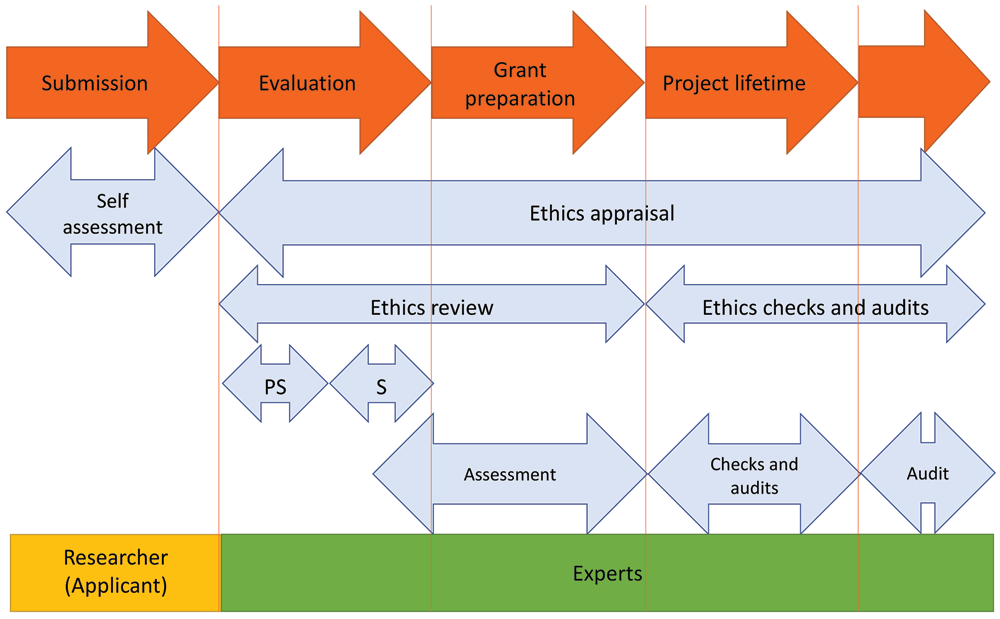
PS – pre-screening, S – screening. Pre-screening in European Research Council (ERC) evaluation process is performed by internal ERC staff.
Proposals that do not raise immediate ethics issues are generally pre-screened by ERC dedicated internal staff, to assess if a full screening is necessary. In MSCA, main-listed proposals are in most of the cases sent automatically for screening. The following step in the ethics review process, the ethics screening, is performed by two or more external independent experts and, in some cases, it is followed by an ethics assessment when a more in-depth analysis is needed for serious or complex ethics issues raised by the proposed research. Grant proposals involving research with human embryonic stem cells or human embryos automatically go for ethics assessment (European Commission, 2019a). Ethics experts are involved in both the screening and the assessment phase. For ERC proposals, ethics assessments are managed internally, whereas MSCA ethics assessments are conducted by the Ethics Sector within the Directorate-General for Research and Innovation (DG RTD).
The final output of the ethics review is the Ethics Summary Report (EthSR), drafted by ethics experts, which includes an ethics opinion on the proposal. This opinion can have the following outcome: i) No ethics issues, when the ethics review confirms that the proposal does not raise any ethics issue; ii) Ethics clearance, when ethics issues are adequately addressed in the proposals, and there is no need for change upon signature of the grant agreement; and iii) Conditional ethics clearance, when the clearance is subject to conditions, usually in the form of “ethics requirements” listed in the EthSR. Ethics requirements must be implemented either before the grant signature, by updating the ethics section of the project description, or at a specific time after the grant signature in the form of ethics deliverables. When an ethics assessment is needed for proposals raising serious or complex ethics issues, the applicants are usually requested to submit additional information for an in-depth ethics analysis before the ethics experts formulate their opinion. Proposals conditionally cleared can therefore be the result of an ethics screening or an ethics assessment. In very rare cases, a project proposal can be rejected on ethics grounds (European Commission, 2019a)
We analysed the data for main-listed proposals from MSCA IF, MSCA ITN calls in 2016-2019, and for ERC calls in 2017-2019, the year for which the data were available in the electronic Submission and Evaluation of Proposals (SEP) tool of the European Commission. SEP integrated the full ethics evaluation process in 2016 for MSCA and in 2017 for ERC. When this study was initiated in 2020, the ethics evaluation process was still not fully completed for IF and ERC, so we considered only the data up to the 2019 calls. As our datasets were based on the structured information available in the EthSR from SEP, they are partially incomplete. They did not include MSCA proposals for which an ethics assessment was performed by the Ethics Sector from DG RTD. These proposals include the cases with human embryonic stem cells or human embryos. The proposals that did not raise any ethics issues or were cleared by the ethics experts were not analysed further, as they correspond to the cases where the applicants either addressed correctly the ethics issues in their proposals or the proposed research did not raise any ethics issues. We focused on the main-listed proposals that were conditionally cleared, as they correspond to the cases where differences existed between what was declared by the applicants and what was later flagged by ethics experts.
The data from SEP were split into two datasets, the first containing the information about the ethics issues identified by applicants and ethics experts, and the second one containing the information about ethics requirements listed by ethics experts. For both datasets, we collected data about the proposal call year, scientific panel/domain, the host country (of the coordinating institution), and ethics issues/requirements categories. We also had the information related to ethics checks. The list of ethics issues as categorized by the European Commission is available in the Extended data (Buljan et al., 2021). The ethics issues are divided into 12 distinct categories, as listed in the Ethics Self-Assessment Checklist: Human embryos/foetuses; Humans; Human cells/tissues; Personal data; Animals; Third countries; Environment, Health & safety; Dual use; Exclusive focus on civil applications; Misuse; and Other ethics issues (European Commission, 2019a).
For ethics requirements dataset, there was no Exclusive focus on civil applications category, and the category General was merged with the Other category.
We worked on anonymized datasets, without insight about the actual content of the proposal, or the names of the applicants or ethics experts, so that issues of personal data protection were not applicable.
Ethics issues and requirements are presented as frequencies and percentages, by type of action (for MSCA) or grant (ERC), call year, and scientific domain. Ethics issues identified by the applicants and ethics experts are presented separately. The number of ethics issues/requirements per proposal is presented as median, with interquartile range (IQR). We calculated odds ratios for the probability that ethics issues in a specific category is identified by ethics experts vs. that it is identified by applicants.
We performed linear regression analysis, where the criterion was the number of ethics issues in a proposal identified by ethics experts, and with the type of action, year, host country, and number of issues in a specific category in a proposal identified by applicants as potential predictors. Host countries ware categorized into research low- and high-performing categories, based on a previously reported composite indicator (Pina et al., 2019). Research high-performing countries were Austria, Belgium, Denmark, Finland, France, Germany, Israel, the Netherlands, Norway, Sweden, Switzerland, and the United Kingdom, and low-performing countries were Bulgaria, Croatia, Cyprus, Czech Republic, Estonia, Greece, Spain, Hungary, Ireland, Iceland, Italy, Lithuania, Luxemburg, Latvia, Malta, Poland, Portugal, Romania, Serbia, Slovenia, Slovakia, and Turkey.
To determine the characteristics of main-listed proposals subject to ethics review, we collected the information about call year, type of action, number of requirements per proposal and research domain in logistic regression. For this analysis, we recoded ethics category groups by omitting Human embryos/foetus category due to small sample size and collapsing Dual use; Misuse; Other, Exclusive use on civil applications (linear regression only) and General (logistic regression only) categories into Other category.
The results are presented as odds ratios with 95% confidence intervals (CI) and Nagelkerke R squared. All analyses were performed using the R software environment for statistical computing and graphics (R Core Team, 2020).
The total number of main listed proposals in the period from 2016-2019 for MSCA and 2017-2019 for ERC, was 485 proposals from ITN, 5365 proposals from IF, and 2632 proposals from ERC (Table S1 in Extended data (Buljan et al., 2021)). Of these, we identified 4936 proposals (58%) that received conditional ethics clearance during the ethics review (excluding those from MSCA that went for an ethics assessment by DG RTD). This means that the remaining 3546 (42%) proposals either had no ethics issues or received ethics clearance (Figure 1, Table S1 in Extended data (Buljan et al., 2021)). Proposals from individual granting schemes more often received ethics clearance (44.3% for ERC proposals and 43.1% for IF proposals) than proposals from research consortia (14.1% for ITN proposals).
Applicants identified 707 ethics issues in 417 proposals from ITN (85.9% out of all main-listed proposals), 4469 issues in 3054 proposals from IF (56.9%), and 2826 issues in 1465 proposals from ERC (55.7%) (Figure 2, Table S1 in Extended data (Buljan et al., 2021)). Ethics experts identified more than two times more issues than applicants: 1676 for ITN, 9695 for IF, and 6912 for ERC proposals. This trend was stable across different types of grants and call years (Figure 2).
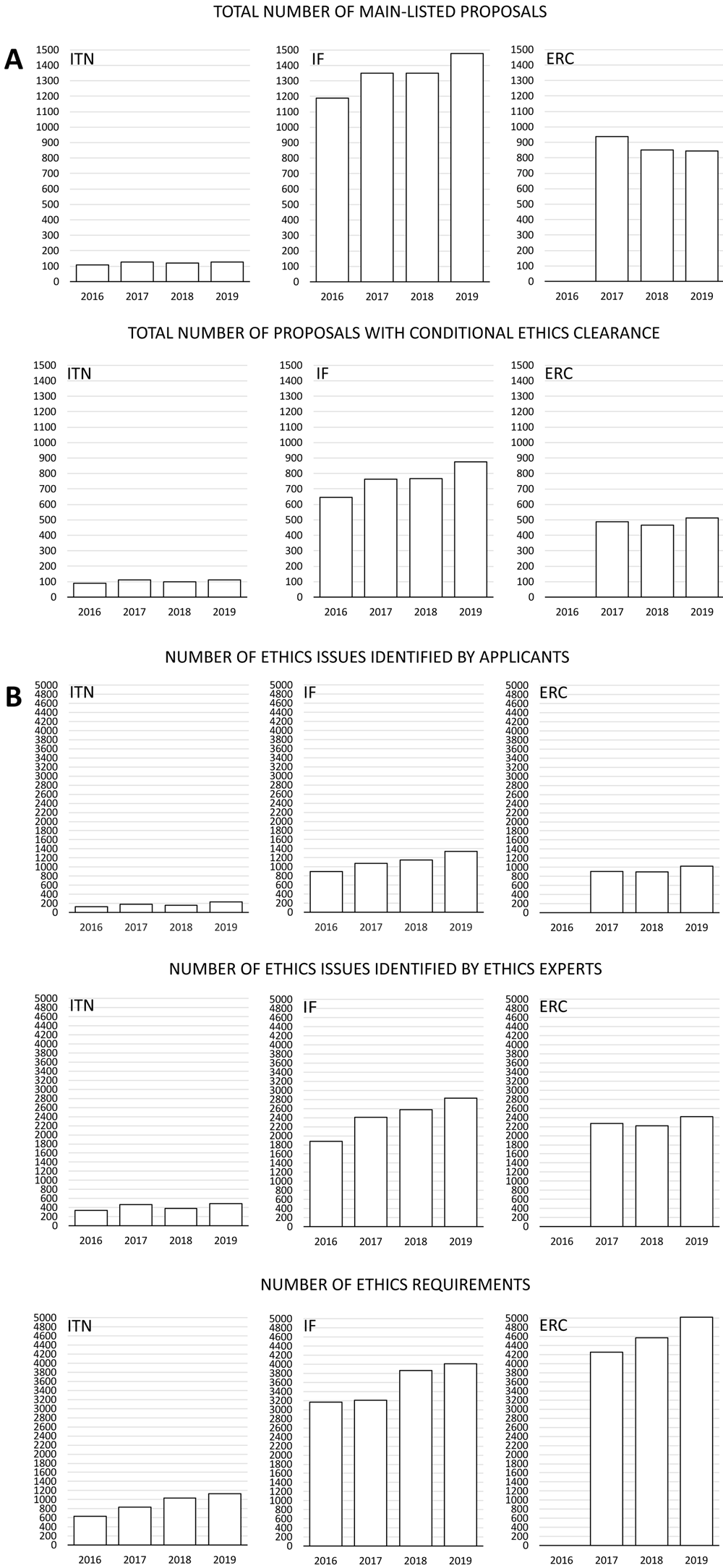
ITN – Innovative Training Networks, IF – Individual Fellowships, ERC – European Research Council grants. The data are from years available in the SEP tool of the European Commission.
The median (Md) number of ethics issues identified by an applicant per proposal was 1 (IQR=0-3) for ITN, 1 (IQR=0-2) for IF, and 2 (IQR=1-3) for ERC, whereas ethics experts identified a median of 4 ethics issues (IQR=2-5) for ITN, 3 (IQR=2-4) for IF, and 4 (3-6) for ERC. This was true for all call years (Figure 3). The most frequently identified ethics issues categories overall were Humans; Protection of personal data; Animals; and Non-EU countries (Table S1 in Extended data (Buljan et al., 2021)). Applicants had higher odds to identify ethics issues related to Humans, Human cells/tissues, Protection of personal data, and Animals categories, whereas ethics experts were more likely to identify ethics issues in categories Non-EU countries and Environment, health and safety (Table S1 in Extended data (Buljan et al., 2021)).

ITN – Innovative Training Networks, IF – Individual Fellowships, ERC – European Research Council grants. The data are from years available in the SEP tool of the European Commission.
With regard to the research domain, applicants from Life Sciences identified the most issues, with 3719 ethics issues (n=3719), followed by Social Sciences and Humanities (n=2916) and Physical Sciences and Engineering (n=1367). On the other side, ethics experts identified two times more ethics issues for proposals in Life Sciences (n=7652) and Social Sciences and Humanities (n=6055), and three times more ethics issues in Physical Sciences and Engineering (n=4576) (Table S2 in Extended data (Buljan et al., 2021)). The same was found for the median number of ethics issues per proposal (Figure 4).
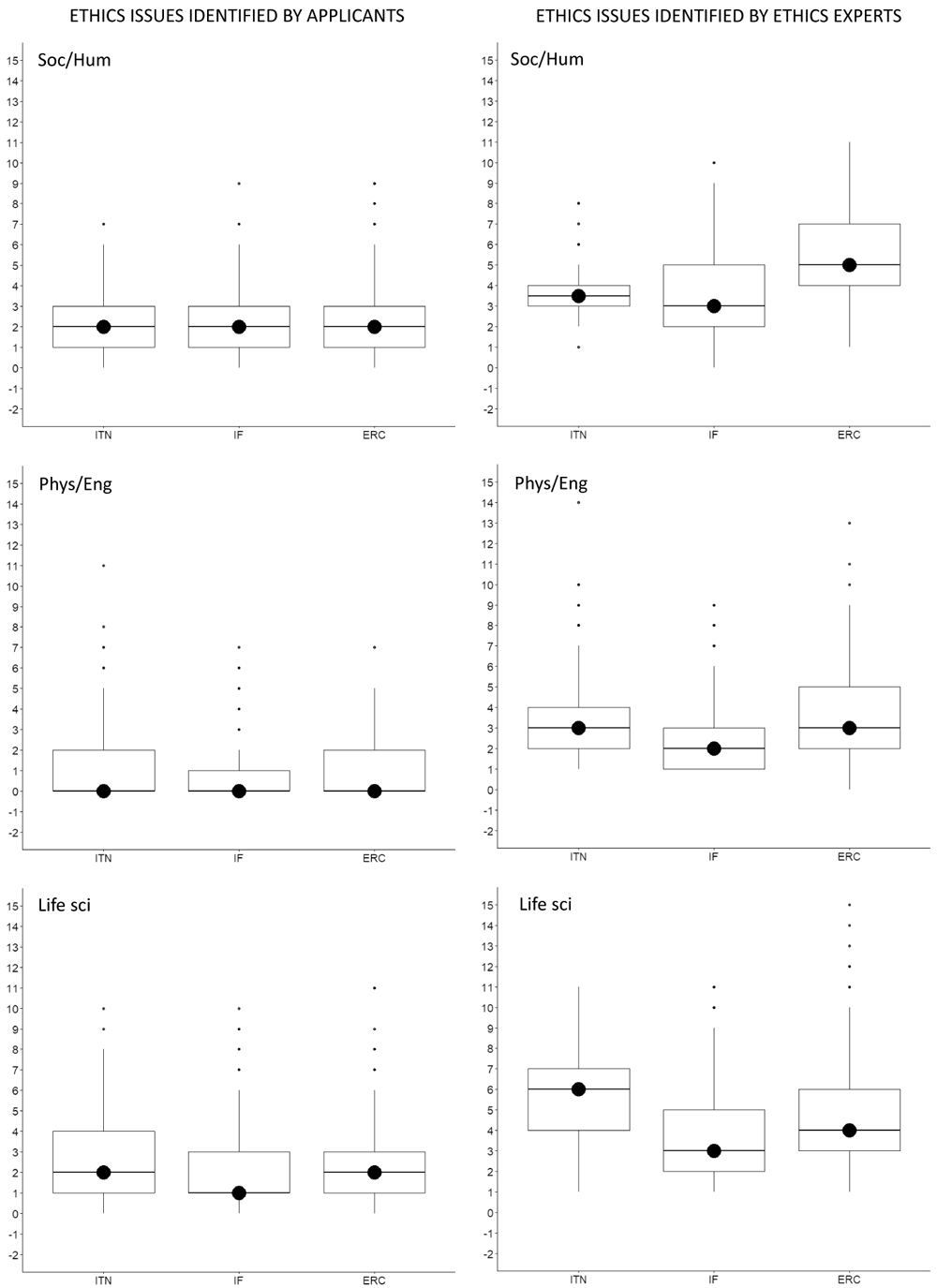
ITN – Innovative Training Networks, IF – Individual Fellowships, ERC – European Research Council grants. The data are from years available in the SEP tool of the European Commission. Soc/Hum – Social Sciences and Humanities, Phys/Eng – Physical Sciences and Engineering, Life sci – Life Sciences.
For Social Sciences and Humanities, the most prevalent categories were Humans, Protection of personal data and Non-EU countries, whereas in Life Sciences and Physical Sciences and Engineering, Animals, Human cells/tissues, and Environment, health and safety categories were more often identified by both the applicants and ethics experts (Figure 5). When observing the total number of ethics issues by category, the above six categories comprised most of the identified ethics issues, regardless of the type of grant (Figure 6). The greatest discrepancy in absolute numbers between project applicants and ethics experts was for the Non-EU countries and Environment, health and safety categories (Figure 6). Proposals from the Physical Sciences and Engineering were characterized by the highest number of issues related to Dual (military) use, identified by both the applicants and the experts (Figure 6).

ITN – Innovative Training Networks, IF – Individual Fellowships, ERC – European Research Council grants. The data are from years available in the SEP tool of the European Commission. Soc/Hum – Social Sciences and Humanities, Phys/Eng – Physical Sciences and Engineering, Life sci – Life Sciences.
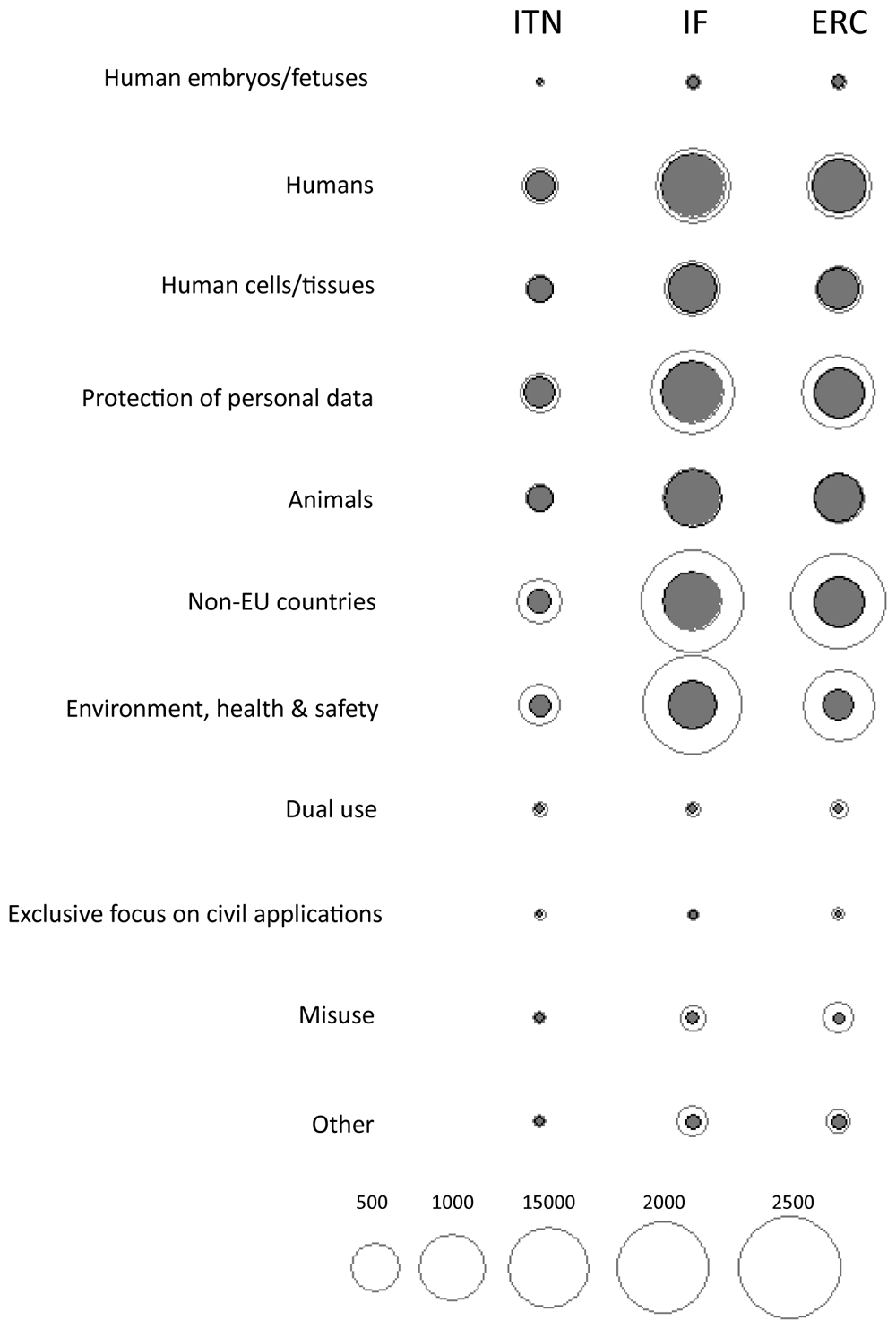
ITN – Innovative Training Networks, IF – Individual Fellowships, ERC – European Research Council grants. The data are from years available in the SEP tool of the European Commission.
Regression analysis, where we assessed which proposal characteristics predicted higher number of identified ethics issues per ethics category by ethics experts, showed that it was more likely that the proposal will have significantly more ethics issues in the same category, identified by ethics experts when it was an ERC proposal, coming either from Life Sciences or Social Sciences and Humanities, or a newer proposal, as well as if it had issues related to the Protection of personal data, Non-EU countries, and Environment, health and safety categories, and had multiple issues identified by applicants in the same ethics category (Table S3 in Extended data (Buljan et al., 2021)). On the other hand, lower number of ethics issues in a same category identified by ethics experts were related to the proposals from MSCA funding schemes (both ITN and IF), from Physical Sciences and Engineering, from an earlier call, and had issues related to the Human cells/tissues, Animals or Other categories, as well as fewer ethics issues by ethics category identified by applicants (Table S3 in Extended data (Buljan et al., 2021)). However, the best predictor for the number of ethics issues identified by ethics experts was the number of ethics issues by ethics category identified by applicants, and it explained 19% of the variance of the criteria when independently entered in linear regression. Proposals which had multiple identified ethics issues per ethics category were more likely to have more ethics issues in a specific category identified by ethics experts.
The number of ethics requirements was greater than the number of ethics issues identified by ethics experts (3625 for ITN, 14249 for IF and 13846 for ERC) (Figure 2). ERC had the highest median number of ethics requirements per proposal (Md=8, IQR=4-14), compared to ITN (Md=6, IQR=3-13) and IF (Md=3, IQR=2-6) (Figure 7). The greatest proportion of ethics requirements was in the Humans, Human Cells/Tissues, Non-EU countries, and Environment, health and safety categories (Figure 8; Table S4 in Extended data (Buljan et al., 2021)). Proposals from Life Sciences and Social Sciences and Humanities domains had the greatest number of requirements (n=12544 and n=12377, respectively). There were 6799 requirements for proposals in Physical Sciences and Engineering (Table S5 in Extended data (Buljan et al., 2021)). All three types of grants were similar in the number of ethics requirements per proposal across domains (Figure 9). Although proposals from Life Sciences and Social Sciences and Humanities had a similar total number of requirements, most of the ethics requirements for Social Sciences and Humanities were in the Humans and Protection of personal data categories. Requirements for proposals in Life Sciences were linked to all ethics categories (Figure 10).
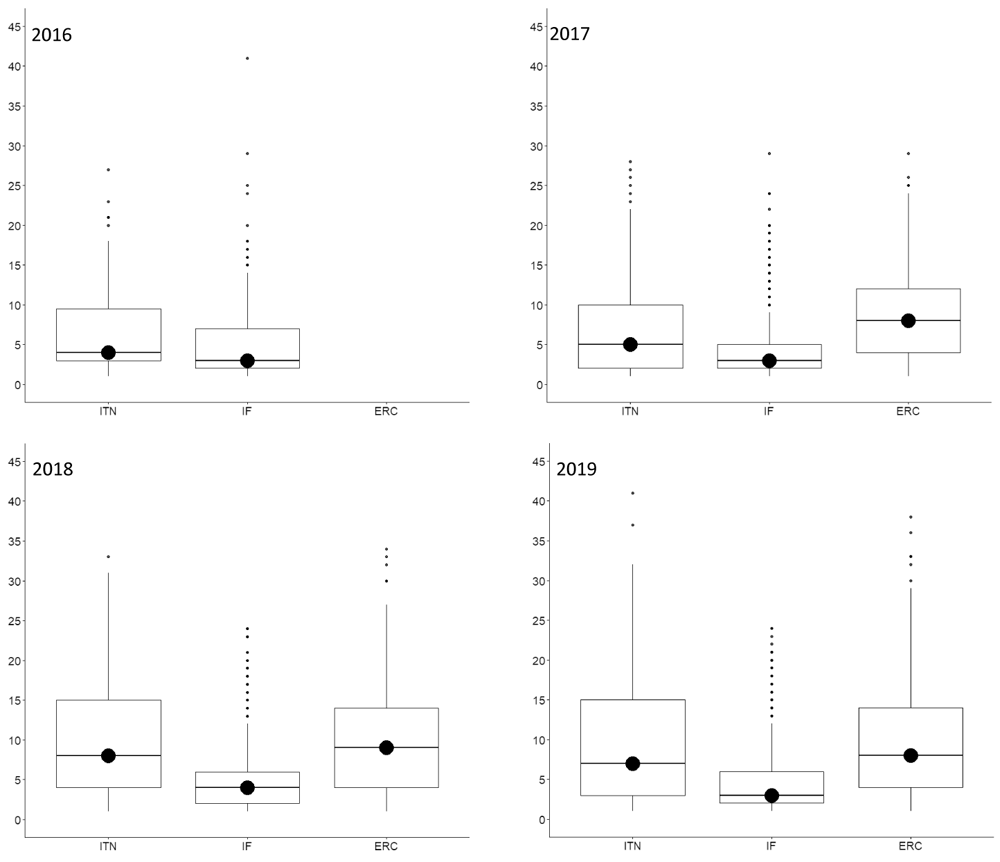
ITN – Innovative Training Networks, IF – Individual Fellowships, ERC – European Research Council grants. The data are from years available in the SEP tool of the European Commission.
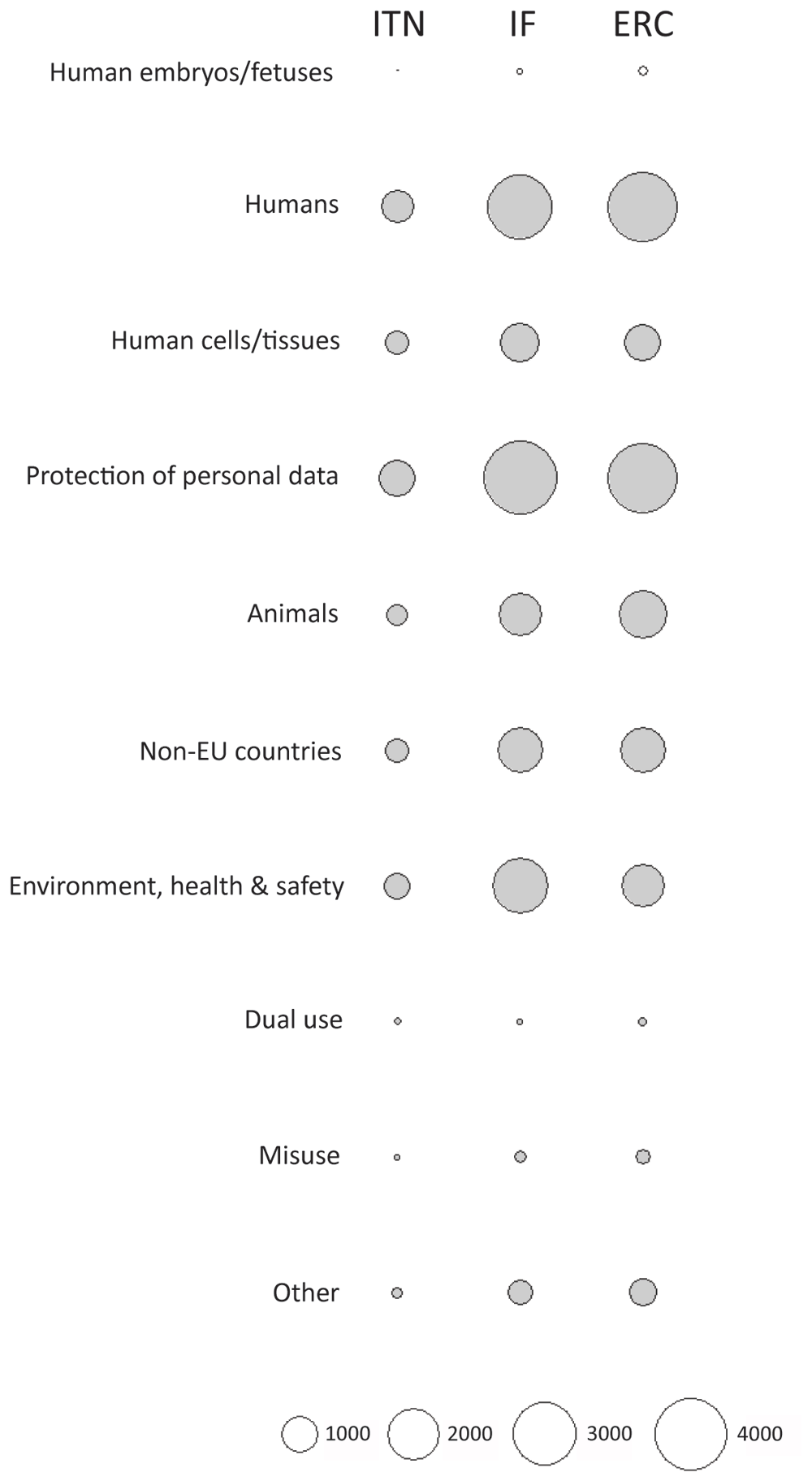
ITN – Innovative Training Networks, IF – Individual Fellowships, ERC – European Research Council grants. The data are from years available in the SEP tool of the European Commission.

ITN – Innovative Training Networks, IF – Individual Fellowships, ERC – European Research Council grants. The data are from years available in the SEP tool of the European Commission. Soc/Hum – Social Sciences and Humanities, Phys/Eng – Physical Sciences and Engineering, Life sci – Life Sciences.
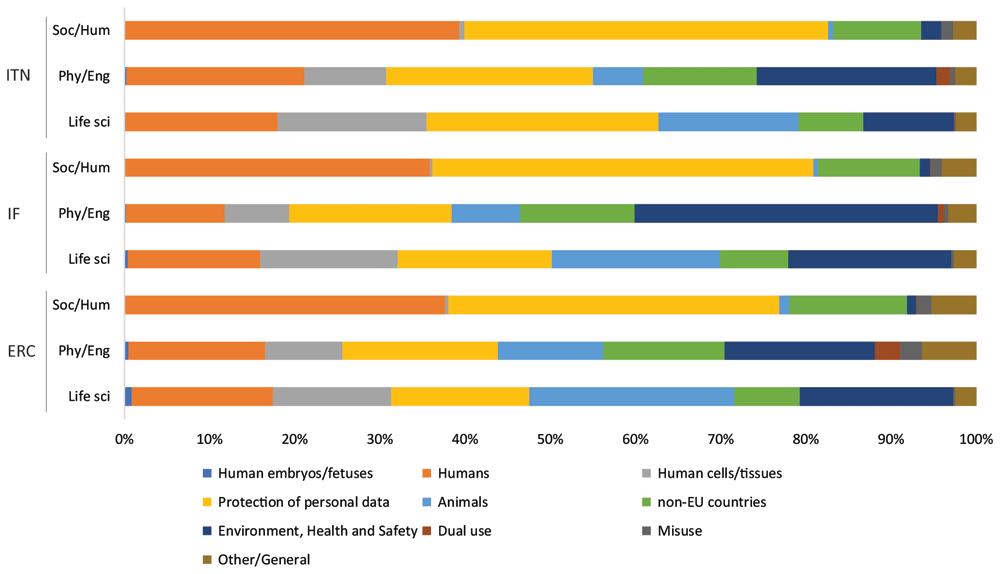
ITN – Innovative Training Networks, IF – Individual Fellowships, ERC – European Research Council grants. The data are from years available in the SEP tool of the European Commission. Soc/Hum – Social Sciences and Humanities, Phys/Eng – Physical Sciences and Engineering, Life sci – Life Sciences.
The majority of requirements’ deliverables were scheduled to be fulfilled after the grant agreement signature: 14162 (99.4%) for IF; 3606 (99.5%) for ITN, and 3600 (26.0%) for ERC. The median deliverable’s month of implementation, when a requirement had to be fulfilled, was month 3 for IF (IQR=1-5, range=1-36), month 12 for ITN (IQR=12-12, range=1-48), and month 12 (IQR=12-12, range=0-55) for ERC.
Ethics checks were required for 43 ITN proposals (10.2%), 141 IF proposals (4.6%), and 185 ERC proposals (12.6%). The predictors of whether a proposal will involve an ethics check were a higher number of ethics requirements, being an MSCA ITN proposal, coming from Social Sciences and Humanities, and being a proposal from an older call year (Table S6 in Extended data (Buljan et al., 2021)). It was also more likely that a proposal will go for an ethics check if it had multiple ethics requirements in the collapsed Other category, and less likely if the multiple requirements were for Animals or Environment, health and safety categories (Table S6 in Extended data (Buljan et al., 2021)).
Ethics experts can require the appointment of an independent ethics advisor or an ethics advisory board, for proposals with complex or serious ethics issues, or when they consider that the applicants did not demonstrate sufficient proficiency in identifying or managing ethics issues. 6.2% of all conditionally cleared proposals had such a requirement (5.3% for ethics advisor and 0.9% for ethics advisory boards). ERC proposals had more such requirements: 14.9% proposals needed ethics advisor vs 1.2% of MSCA proposals, and 2.5% needed ethics advisory boards vs 0.3% for MSCA proposals. For MSCA proposals, there was no clear difference, except for the predominance of proposals from Social Sciences and Humanities among proposals needing an ethics advisor (8 out of 11 proposals) and Life Science proposals among ITN (12 out of 32 proposals). Half (51.1%) of the proposals that required some kind of ethics monitoring, either by ethics advisors or boards, during the project lifetime also required an ethics check.
To the best of our knowledge, this is the first study that explored in detail the characteristics of the ethics review in highly competitive H2020 proposals across research disciplines and funding schemes. We showed that about half (42%) of the proposals did not require an ethics review, either because the proposed research did not raise ethics issues or the applicants adequately addressed ethics issues. However, for those that received conditional ethics clearance, both the individual researchers (in IF and ERC granting schemes) and research consortia (ITN grants) were not good in identifying ethics issues generated by the proposed research because ethics experts identified two times more ethics issues. The applicants were better at identifying “classical” ethics issues – those related to research involving humans or human cells and tissues, protection of personal data, and animals, but not as good in identifying ethical challenges related to the research involving collaboration with other countries, and environmental, health and safety issues. The reason for this may be the fact that the latter ethics categories are more legal in nature, requiring different types of legal documentation and procedures (European Commission, 2019b), and may not be perceived as a “true” ethics issue. The same was true for ethics categories that were generally rarely identified: Dual-use and Exclusive focus on civilian applications (research that could be used for military applications) and Misuse (research for unethical purposes such as terrorism). Ethics experts, who are considered as the “golden standard” for ethics review, identified twice as more ethics issues, in general and per proposal. For some proposals, they required formal ethical support and monitoring in the form of individual ethics advisors or ethics advisory board or as ethics checks at some points during the life time of the project.
We observed important differences in identified ethics issues between different research domains and grant types. The proposals with fewer ethics issues in the same category identified by ethics experts were those where applicants identified fewer issues in the same category, in MSCA compared to ERC grant calls, those from Physical sciences and Engineering domain, proposals from earlier periods/years and those with ethics issues in categories Human cells/tissues, Animals or Other (including Dual use, Misuse, General and Other ethics issues). There was general congruence between the applicants and ethics experts in identification of ethics issues categories, except that experts identified more issues. The finding that ERC proposals had more ethics issues than MSCA ITN and IF may be related to the ERC selection priority for breakthrough research, which brings higher risk and uncertainty (European Research Council, 2019). Proposals from Life Sciences and Social Sciences and Humanities had more ethics issues and resulting ethics requirements than those from Physical Sciences and Engineering because they more often include research with human participants or with animals. Finally, very small but significant influence of the year of proposal was found for both the number of issues and ethics requirements, with higher numbers in later years. The study time period (2016–2019) was the period of significant change for one of the major ethics issues: in 2016, the General Data Protection Regulation (GDPR) was enacted in the EU, with the implementation starting from mid-2018 (European Commission, 2016). This means that the researchers in later grant years could become more aware of these new requirements and paid more attention to ethical issues in general. However, the Personal data protection category did not emerge as a predictor in any of the regression analyses in our study. It is also possible that the efforts that the European Commission and research performing or research granting institutions have invested in the promotion responsible conduct of research (Ščepanović et al., 2021; Mejlgaard et al., 2020) had an effect over the years. However, the median number of ethics issues per proposal remained stable over the study period, implying that applicants did not improve their performance in identifying ethics issues over time. Longer follow-up studies and controlled study designs, such as interrupted time series (Pina et al., 2021), are needed to test the effect of time on ethics appraisal of grant proposals.
The need for more proactive approach to ethics training and assistance to researchers is clear. For example, applicants from the Physical Sciences and Engineering domain may be, in many cases, unaware of ethics issues raising from the development of new prototypes, instruments or software involving any testing with human participants. This need is also in the number of proposals where the ethics experts required the appointment of an Ethics Advisor, in order to help in the management and monitoring of the ethics issues during the project. In some other proposals, the establishment of a larger Ethics Advisory Board was deemed necessary to coordinate the management of complex and/or serious ethics issues. Such projects very rarely included ethics monitoring already in the proposal, meaning that the applicants and their institutions were not aware of the complexities or seriousness of ethics issues in their research.
The complexity of ethics issues raised by proposed research differed between different grant calls. While individual fellowship (IF) proposals required an ethics check during the ethics review process in about 5% of the cases, ITN proposals, which are submitted by a consortium of research institutions, and ERC grants, which are individual proposals but involving high-risk research, required ethics checks two times more often. Taking ethics check requirement as a proxy for complex and specific ethics issues, regression analysis identified that such proposals had more ethics requirements and were coming from the Social Sciences and Humanities Domain, had more ethics requirements in the Non-EU and Dual use, Misuse, General and Other categories and from older calls. This complexity is also reflected in the number of proposals that had to fulfil ethics requirements during the project lifetime (around 99% for IF and ITN and 26% for ERC). ERC proposals also had almost ten times more requirements for an ethics advisor than MSCA grants. The reasons for these differences are not clear – they may be related to the specificities of the calls or proposed research, or the organization of the ethics appraisal process. Our study showed clear differences between the ethics review procedure between ERC and MSCA, but we currently do not have any evidence on relevant outcomes that would indicate possible differences in their effectiveness.
Our study had some limitations that need to be acknowledged. We did not have information about the actual content of the proposals so that the ethics issues could be assessed independently. We considered ethics experts review procedure as the golden standard in ethics assessment, just as scientific expert review is used as a measure of the scientific quality of the proposal (Pina et al., 2021). The sample in our study included only the highest ranked proposals considered for funding, as only these proposals undergo ethics review. We do not know whether the applicants whose proposals did not get funded had better, worse or similar skills in identifying ethics issues as those of funding proposals. We also did not evaluate the proposals that received ethics clearance, so we did not determine whether the reason for ethical clearance of half of the main-listed projects was because the applicants adequately addressed ethics issues or if it was because the project did not raise ethics issues. The results of our study could be considered as an indication of best ethics practices among participants in EU grant proposals, as they select the best proposals in highly competitive calls. Finally, we did not explore in detail the qualitative (textual) content of the ethics review, which could identify in specific ethics issues raised by the proposed research and those addressed in ethics requirements.
It is difficult to put the results from our study in a more general context as there are no studies of ethics as an important aspect of grant evaluation (Buljan et al., 2020). We know that authors of research papers are generally poor in reporting ethics issues (Taljaard et al., 2011). There are many studies assessing different aspects of publications ethics, including examples such as consent for publishing identifiable medical images (Roguljić et al., 2020) or authorship (Marušić et al., 2011), because the data for such studies are publicly available, in contrast to the information on grant evaluation.
Research performing and research funding organizations are the places where the problem of the competence of researchers to identify and address ethics issues must be addressed. This problem is a part of a greater problem of shaping structures and processes for research ethics and research integrity to promote responsible conduct of research (Mejlgaard et al., 2020). Different approaches to these issues have been described, ranging from education and training in research ethics (Dubois et al., 2008) and research integrity (Marušić et al., 2016). For example, some organizations (LARI, 2021) provide ethics and integrity support to early-stage researchers in the form of integrity coaches or advisors, which help researchers navigate through ethics and integrity requirements during their research. There are also efforts at the policy level (ALLEA, 2017), as well as at the level of organizational culture and climate for responsible research (Viđak et al., 2021), but we do not have quality evidence of whether these efforts actually work.
It is also important to keep in mind the differences between research disciplines, which have been already recognized in the context of ethics codes (Aagaard-Hansen & Johansen, 2008). In our study, research in different disciplines did not result in the difference in the number of identified ethics issues, but in the different pattern of the distribution among ethics categories. Research proposals from Physical Sciences and Engineering had mostly ethics issues related to collaboration with non-EU countries and those related to environment, health and safety. They also had the largest prevalence of ethics issues in Dual use category, compared to other domains. While the proposals from Life Sciences did not have a clear predominance among major ethics issues – those related to research involving humans and animals, non-EU countries and health and environment, dominating ethics issues in the proposals from Social Sciences and Humanities were related to the involvement of human participants and personal data protection. Researchers from Social Sciences and Humanities were not good at identifying these issues, as the difference in ethics issues identified by applicants and the issues and requirements put forward by ethics experts was greatest for proposals in this research domain. This has been recognized by the European scientific community and specific research ethics guidance has been developed for social sciences (European Commission, 2018).
Finally, the heterogeneity of research ethics and research integrity structures and processes in Europe (European Commission, 2019b), as well as differences in research integrity codes across Europe (Desmond & Dierickx, 2021), do not help researchers in understanding what is expected from them in regard to research ethics, especially when they work in collaborations that cross country boundaries. As we did not find differences between countries that are high performers in research and those that are not, the problems in identifying ethics issues in their research proposals seem to be common to all research communities across Europe.
Our study demonstrated that researchers are not always adequately competent in recognizing and addressing ethics issues in research that they propose to grant agencies, and that this problem persisted over the last four years of EU research funding framework. Although there are intensive efforts to promote training and restructuring of research ethics and research integrity framework at all levels of research in Europe (Mejlgaard et al., 2020), more concrete actions that are actually resulting in a positive change are needed. We also need to study the process of ethics evaluation of grant proposals and research project execution in order to identify critical points for change and/or improvement, as well as facilitators and barriers to successful management of ethics issues in research. Although such studies may be methodologically complex and demanding, and involve both quantitative and qualitative approaches, they are needed so that we can better understand the problem and formulate solutions. Only when we have evidence for effective actions, we will be able to provide support to researchers to deal with ethical issues in their research and prepare for emerging ethical challenges, such as the use of gene-editing (European Group on Ethics in Science and New Technology, 2021) and artificial intelligence (European Parliament, 2019) in research.
OSF: Ethics issues identified by applicants and ethics experts in Horizon 2020 grant proposals. https://doi.org/10.17605/OSF.IO/T765V (Buljan et al., 2021).
This project contains the following underlying data:
OSF: Ethics issues identified by applicants and ethics experts in Horizon 2020 grant proposals. https://doi.org/10.17605/OSF.IO/T765V (Buljan et al., 2021).
This project contains the following extended data:
List of ethics issues as categorized by the European Commission
Table S1. Number of ethical issues identified by applicants and ethics experts for MSCA ITN and IF and the ERC, per call year
Table S2. Number of ethical issues identified by applicants and ethics experts, by scientific domain, for MSCA ITN and IF and the ERC
Table S3. Linear regression for predicting number of ethics issues per category in a proposal identified by ethics experts
Table S4. Number of ethics requirements identified by applicants and ethics experts in MSCAITN and IF and the ERC, per call year
Table S5. Number of ethics requirements, by scientific domain, for the ERC
Table S6. Logistic regression for prediction of whether a proposal will go to ethics check (0-No,1-Yes)
OSF: STROBE checklist for ‘Ethics issues identified by applicants and ethics experts in Horizon 2020 grant proposals’. https://doi.org/10.17605/OSF.IO/T765V (Buljan et al., 2021).
Data are available under the terms of the Creative Commons Zero "No rights reserved" data waiver (CC0 1.0 Public domain dedication).
We thank Antonija Mijatović, PhD, University of Split School of Medicine, for her help in extracting data.
This study was presented in part at the PEERE Conference, Valencia, Spain, 29 September-1 October 2020.
| Views | Downloads | |
|---|---|---|
| F1000Research | - | - |
|
PubMed Central
Data from PMC are received and updated monthly.
|
- | - |
Competing Interests: No competing interests were disclosed.
Reviewer Expertise: Genetics, Ethics, Bioethics
Is the work clearly and accurately presented and does it cite the current literature?
Yes
Is the study design appropriate and is the work technically sound?
Yes
Are sufficient details of methods and analysis provided to allow replication by others?
Yes
If applicable, is the statistical analysis and its interpretation appropriate?
Yes
Are all the source data underlying the results available to ensure full reproducibility?
Yes
Are the conclusions drawn adequately supported by the results?
Yes
Competing Interests: No competing interests were disclosed.
Reviewer Expertise: developmental physiology, bioethics, research integrity, science management
Is the work clearly and accurately presented and does it cite the current literature?
Yes
Is the study design appropriate and is the work technically sound?
Yes
Are sufficient details of methods and analysis provided to allow replication by others?
Yes
If applicable, is the statistical analysis and its interpretation appropriate?
Yes
Are all the source data underlying the results available to ensure full reproducibility?
Yes
Are the conclusions drawn adequately supported by the results?
Yes
Competing Interests: No competing interests were disclosed.
Reviewer Expertise: Genetics, Ethics, Bioethics
Alongside their report, reviewers assign a status to the article:
| Invited Reviewers | ||
|---|---|---|
| 1 | 2 | |
|
Version 2 (revision) 06 Sep 21 |
read | |
|
Version 1 15 Jun 21 |
read | read |
Provide sufficient details of any financial or non-financial competing interests to enable users to assess whether your comments might lead a reasonable person to question your impartiality. Consider the following examples, but note that this is not an exhaustive list:
Sign up for content alerts and receive a weekly or monthly email with all newly published articles
Already registered? Sign in
The email address should be the one you originally registered with F1000.
You registered with F1000 via Google, so we cannot reset your password.
To sign in, please click here.
If you still need help with your Google account password, please click here.
You registered with F1000 via Facebook, so we cannot reset your password.
To sign in, please click here.
If you still need help with your Facebook account password, please click here.
If your email address is registered with us, we will email you instructions to reset your password.
If you think you should have received this email but it has not arrived, please check your spam filters and/or contact for further assistance.
Comments on this article Comments (0)